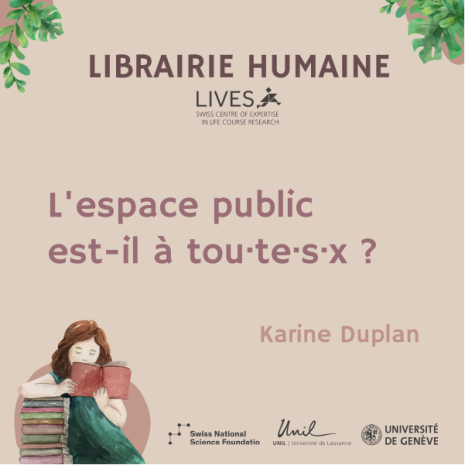By Karine Duplan
Karine Duplan is a geographer at the University of Geneva. Her research, funded by Centre Maurice Chalumeau in sciences of sexualities, focuses on the spatial dimension of inequalities and privileges with a view to social justice. She is interested in the production of inequalities linked to gender and sexuality as well as the exclusions that this produces.
Her story shows how one lives in Geneva when one is outside of heteronormativity. It is linked to her research which highlights ways of working to produce less oppressive and more welcoming spaces for all.
TRIGGER WARNING: this story narrates difficult experiences and uses vocabulary that may be offensive or uncomfortable to some audiences.
This story is told in French.
In Geneva, the international capital of peace, there are still many people who cannot move freely in public spaces. In the course of my research, Deb, Loreleï, Alissa, Léïla, among other people I met, shared with me their everyday experiences in these so-called public spaces.
Deb is Canadian. She came to Switzerland 20 years ago for her studies and then settled in Geneva. She tells me that in the evening, when she goes home alone, she is afraid. Because she is a woman. And when she goes home with her partner, she is afraid of being attacked because they are lesbians, and it shows. Once, in the tram, they weren't even touching each other, they were just close to each other, two guys started to look at them in the corner, sniggering, saying: "hey, look at her, they're dirty dykes! It was the moment they were about to get out of the tram, so they got out. But what do you do in these moments? Deb points out that she and her partner never hold hands when they walk together. Too risky. To forget, to erase oneself, to avoid confrontation... Holding hands with the person you love and are loved by thus becomes a political act.
Loreleï is French-Swiss, studying at the University. She is a non-binary trans person. This means that she does not recognise herself in the sex she was assigned at birth, boy or girl, and that she does not recognise herself in the gender binarity either, i.e. she does not identify herself as a man or a woman. Lorelei thus uses the pronoun 'iel' to signify her non-binarity. Loreleï tells me that he has already been physically attacked in Geneva. A guy like that, there, in the street, who jumped on her, and then started calling her names, trash, by putting her on the ground. It was just before the Pride, there was already all the animation starting, with flags everywhere. Almost even more violent to be assaulted in the context of Pride - well, as if it could be any more violent. Someone passing by intervened, which 'saved' him. Lorelei eventually filed a complaint. At the trial, and despite the existing laws, the homophobic attack was not retained. Lorelei is a trans person, and the laws today do not recognise transphobia.
Alissa is Brazilian. She arrived in Geneva recently, seeking asylum because her life was in danger due to her trans-identity. She has seen many of her relatives persecuted and some have even lost their lives. Alissa lives in fear. Always afraid of being attacked. And even though she has not experienced any physical aggression since she has been in Geneva, the low-key comments, the intrusive looks, the inappropriate remarks, weigh on her every move. Like the time, in the supermarket, when she was still in transition, a group of young people accosted her and asked her head-on if she was a man or a woman. She faces them and it passes. Or again, at the post office, where she comes to collect a parcel and her gender identity on her papers does not correspond to her gender expression: she tricks them and pretends to be someone from the family. Both public and institutional spaces remain hostile for Alissa. She prefers community spaces, those of the so-called LGBTIQ+ associations. Alissa speaks of them as places of refuge where one can be oneself, sometimes; resource spaces that allow one to meet with others with similar backgrounds and trajectories, shared spaces that make up for the heteronormative public space.
Léïla is Swiss and grew up on the German side. Léïla calls herself a feminist. For a long time, she thought of her fight against patriarchy from her position as a woman. Until she fell in love with a woman and discovered her bisexuality. Léïla recounts how doors were closed when they looked for a flat together: as a same-sex couple, their file went straight to the bottom of the list. Until they found a sublet through her partner's network. Léïla is Protestant, and her faith is an important driving force in her life, which she leads in a discreet way. Even at work, where she does not talk about her partner. But still... when she walks around the city, what counts for her are these signs, these signs that allow her to identify herself, to feel present. During Pride, and also during the campaign for marriage for all, the rainbow flags hung everywhere in the street by the public authorities. And also on balconies, by people like her, or allies, who support her. These flags are for Léïla like rallying points that allow her to see herself somewhere in this space where she passes most of the time without making any noise, without leaving any trace, bubbles that make her feel existing in the eyes of others, feeling seen and recognised, bubbles that give her happiness.
So is public space really public? These pieces of experience, from various trajectories, testify to the contrary. When you are a person belonging to a sexual or gender minority - a homosexual, trans, bi, queer or non-binary person - you have to deal with, and if you can, negotiate with these norms of sex, gender and sexuality, with the he-ness of our society and of all the spaces we frequent, cross and practice. Access to public spaces thus remains a form of privilege. How then can we feel that we belong to a city where everything seems to be against us? In this research I want to: show how we live in Geneva when we identify with these communities; and report on the means of action, existing or to be implemented - at the level of policies, but also at the level of collectives, associations, and our actions, all of us, so as to produce less oppressive, more welcoming spaces - for all.



